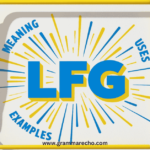The abbreviation for breakfast is often shortened to BKF, Bfast, or BF. These abbreviations make writing quicker in casual settings. They are widely used in texts, notes, and social media.
Imagine texting a friend about morning plans. Instead of typing “breakfast,” you write “BKF.” It saves time and feels natural. This small change makes communication faster and more efficient.
Pronounce Bfast as “bee-fast” and BKF as “B-K-F.” Use them in informal chats, but avoid formal writing. Always consider your audience to ensure clear communication.
What Is the Abbreviation for Breakfast?
Breakfast lovers often shorten the word for convenience in fast-paced communication. The most common abbreviation is BKF, widely used in texts and casual chats. Another popular choice is Bfast, pronounced “bee-fast,” favored for its simplicity. Some people use BF for brevity, though it’s less common. These shortcuts save time and effort in informal settings. They’re widely understood among native English speakers.
The abbreviation BKF stands for “breakfast” and is ideal for casual contexts. You’ll see it in texts, notes, and social media posts. For example, “Meet me for BKF at 9 a.m.!” is a common phrase. Bfast works similarly but is slightly less formal. BF is the most minimal option, often used in quick messages.
Using breakfast abbreviations reflects modern communication trends. They align with the rise of texting and instant messaging. Abbreviations like BKF and Bfast simplify writing without losing meaning. They’re perfect for busy mornings or casual planning. Always consider your audience when using them.
Read also: Abbreviation for Payment: Definition & Meaning
How to Pronounce “Breakfast” and Its Abbreviations
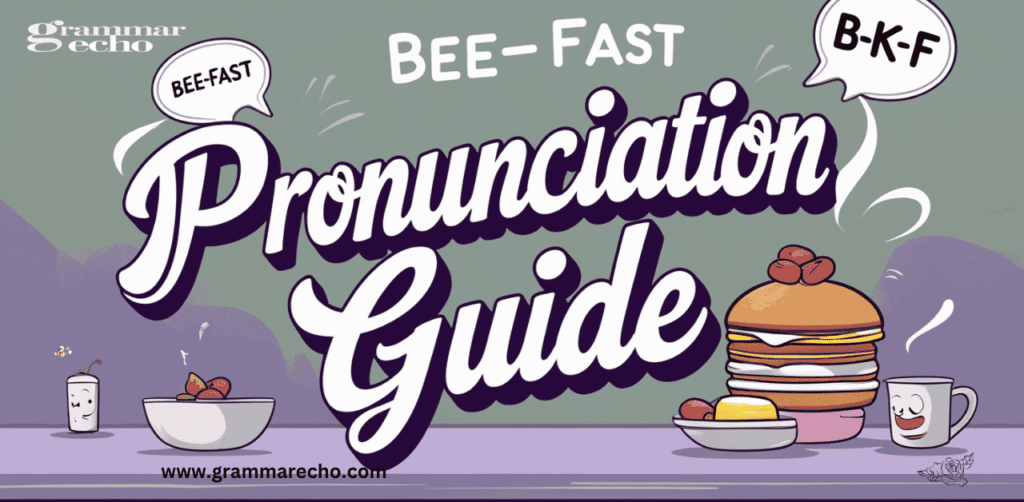
The word “breakfast” breaks into two parts: BREAK-fast. Stress the first syllable for clarity. This pronunciation emphasizes the act of breaking an overnight fast. Mispronouncing it can lead to confusion. Practice saying it slowly to master the rhythm.
For Bfast, pronounce it as “bee-fast,” like a buzzing bee. This phonetic spelling makes it easy to say aloud. BF is simply “B-F,” spoken as individual letters. Using these pronunciations ensures clear communication. They’re especially useful in verbal conversations.
Pronunciation matters in both written and spoken contexts. Using the correct sounds prevents misunderstandings. For example, saying “bee-fast” instead of “break-fist” avoids errors. Teach these pronunciations to others for consistency.
The Definition of Breakfast: More Than Just a Meal
Breakfast is the first meal of the day, eaten after overnight fasting. It replenishes energy and kickstarts metabolism. A balanced breakfast includes carbs, protein, and vitamins. Skipping breakfast can lead to fatigue and poor concentration. This meal has cultural significance worldwide.
In the USA, breakfast often includes eggs, toast, cereal, or yogurt. It’s a time for family bonding or solo reflection. Breakfast sets the tone for the day. Nutritious options like oatmeal or smoothies provide lasting energy.
Breakfast also has economic importance. The breakfast food industry generates billions annually. Restaurants and cafes rely on morning crowds. Breakfast menus drive sales and customer loyalty. This meal supports local businesses.
Synonyms for Breakfast: Spice Up Your Vocabulary
Here are alternatives to “breakfast” to add variety:
- Morning meal: A general term for the first daily meal.
- AM snack: Emphasizes a light, quick option.
- First meal: Highlights its position in the day.
- Brunch: Combines breakfast and lunch for late mornings.
- Dawn Feast – Emphasizes the early timing and importance of the meal
- Daybreak Dining – Poetic way to describe your morning nourishment
- Morning Fuel – Highlights the energizing aspect of breakfast
- Sunrise Sustenance – Links the meal to the day’s beginning
- Early Eats – Casual, modern way to reference breakfast
- Power Start – Focuses on the meal’s energy-boosting properties
- First Feast – Simple way to indicate it’s the day’s first meal
- Morning Munch – Playful, informal term for a light breakfast
- Dayspring Dining – Elegant alternative for formal writing
- Wake-Up Bites – Casual term emphasizing the meal’s timing
Using synonyms improves writing style. They fit different contexts and tones. For example, “morning meal” works in formal settings, while “AM snack” suits casual chats.
Synonyms also avoid repetition. Instead of repeating “breakfast,” use “morning meal” or “first meal.” This keeps your writing fresh. Experiment with synonyms to find the best fit.
You should read: Abbreviation for Transfer? Definition & Examples
Antonyms for Breakfast: Contrasts in Timing
Here’s a fresh look at terms that contrast with your morning meal:
- Moonlight Meal – The evening counterpart to breakfast
- Night Nourishment – Emphasizes the opposite time of day
- Evening Eats – Casual term for end-of-day dining
- Sunset Supper – Poetic contrast to morning meals
- Starlight Snack – Late-night eating opposite to breakfast
- Final Feast – The last meal, contrasting with breakfast as first meal
- Nightcap Nibbles – Light evening eating
- Dusk Dining – Evening meals that bookend breakfast
- PM Plates – Casual reference to after-hours eating
- Wind-Down Feast – Meals that close rather than start the day
Using antonyms clarifies meal distinctions. For example, “dinner” vs. “breakfast” shows time and content differences. This helps in scheduling and planning.
Antonyms also add precision to writing. Instead of vague terms, use specific meal names. This improves clarity and professionalism.
The History of Breakfast and Its Abbreviations
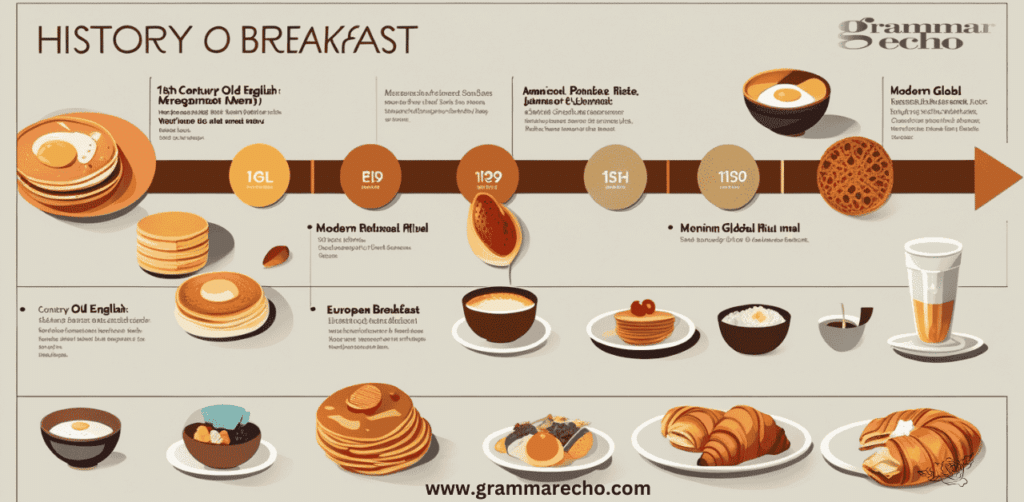
The word “breakfast” dates back to the 15th century. It comes from Old English morgenmete (morning meal). Over time, it evolved into a global ritual. Breakfast now varies widely across cultures.
Abbreviations like BKF emerged with mobile texting in the 1990s. Character limits encouraged shorter words. Bfast and BF followed suit. These shortcuts reflect modern communication trends.
Today, breakfast abbreviations are common in casual settings. They save time and effort in fast-paced chats. Historically, breakfast has always been a social and nutritional staple.
When to Use Breakfast Abbreviations
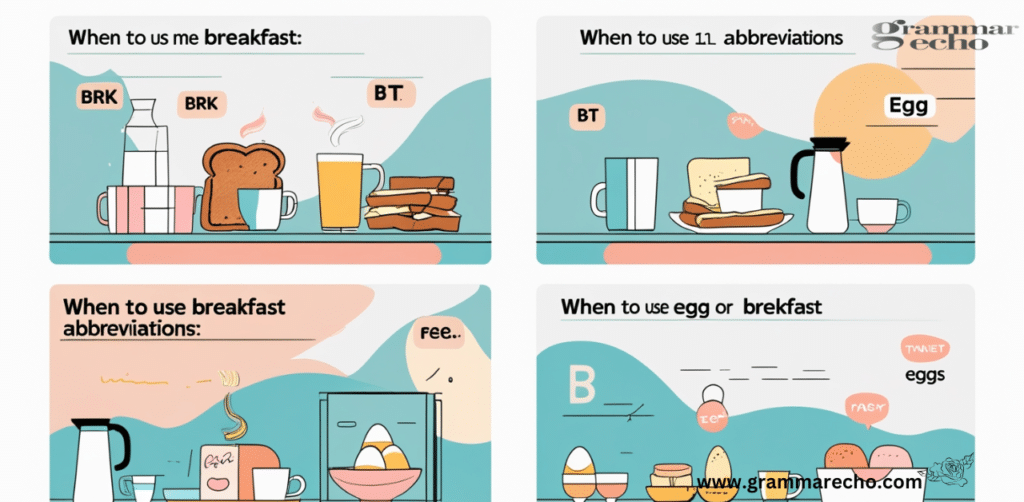
Casual Contexts
- Texts: “Meet me for BKF at 9 a.m.!”
- Social media: “Grabbing Bfast before yoga.”
- Notes: “Bfast items: eggs, toast, juice.”
Formal Contexts
- Emails: “Breakfast will be served at 8 a.m.”
- Reports: “The study analyzed breakfast habits.”
- Contracts: “Breakfast is included in the package.”
Avoid abbreviations in professional settings. They may seem unpolished. Use full words for clarity and formality.
Learn more: 500+ Adjectives Start with G: Boost Your Vocabulary and SEO
Breakfast Abbreviations in Action: Real-Life Examples
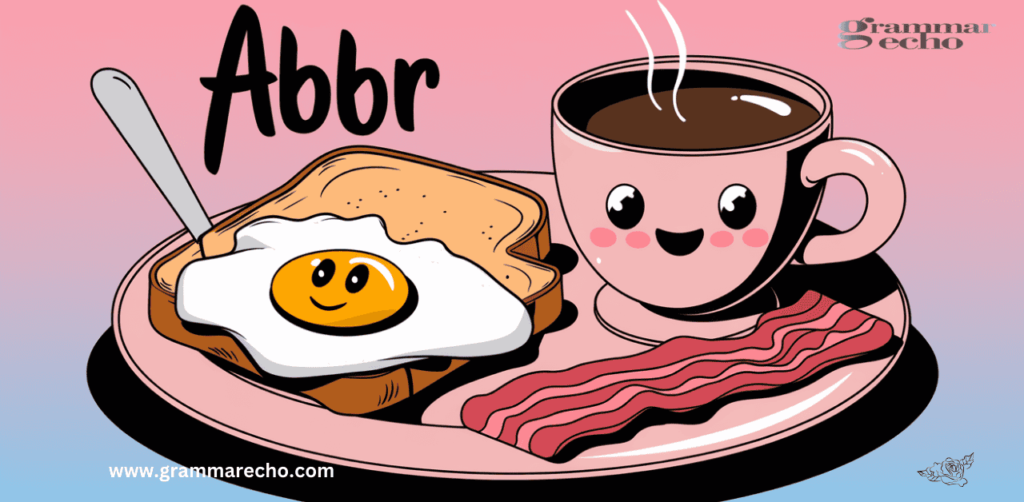
Texting a Friend
- “I’ll skip BKF, see you at lunch.”
- “Grab Bfast before the meeting?”
- “BKF plans for tomorrow?”
Planning a Menu
- “Bfast options: eggs, toast, oatmeal.”
- “Need ingredients for BKF.”
- “Bfast bar opens at 7 a.m.”
Formal Writing
- “Breakfast attendance is mandatory.”
- “The breakfast menu includes pancakes.”
- “Breakfast hours are 7–9 a.m.”
Examples clarify when to use full words vs. abbreviations. They show practical applications in daily life.
Pro Tips for Mastering Breakfast Abbreviations
Pair abbreviations with emojis: “BKF 🥐 at 8?”
Avoid overusing them in formal documents.
Use “breakfast” when clarity matters most.
Practice using abbreviations in casual chats.
Teach friends and family for consistency.
Always consider your audience before abbreviating.
These tips enhance communication skills. They ensure proper usage in various contexts.
Why Breakfast Matters: Beyond the Abbreviation
Breakfast fuels the body and mind. It improves focus and productivity. Skipping breakfast links to health risks like obesity.
A nutritious breakfast includes fruits, grains, and protein. Examples are oatmeal with berries or scrambled eggs.
Breakfast also has social value. It’s a time for family bonding or solo reflection. This ritual enhances daily routines.
FAQs
Breakfast is the first meal of the day, eaten in the morning after sleeping. It breaks the overnight fast and provides energy to start your day. It often includes foods like eggs, toast, cereal, or fruit.
Common abbreviations for breakfast are BKF, Bfast, or BF. These are used in casual settings like texts or notes. For example, “Meet me for BKF at 9 a.m.”
The abbreviation for bed and breakfast is BB. This term refers to accommodations that include breakfast. It’s widely used in hotels and travel planning .
The short term for breakfast and lunch combined is brunch. It’s a meal eaten late in the morning, blending elements of both breakfast and lunch.
Conclusion
Abbreviations like BKF, Bfast, and BF simplify casual communication. They save time in texts and quick notes. Always use them in informal settings.
For formal writing, stick to “breakfast.” This ensures clarity and professionalism. Choose the right words based on your audience. Enjoy using these shortcuts in your daily chats! Breakfast is more than a meal; it’s a daily ritual. It supports health, productivity, and social connections.
Enjoy your breakfast today, whether abbreviated or fully spelled out. Share this guide with friends for better communication!

“Autumn Rose is a contributor to our blog who loves language. She writes about word meanings, spelling tips, and adjectives. Her goal is to make grammar easy and fun for everyone, helping readers improve their language skills.”



